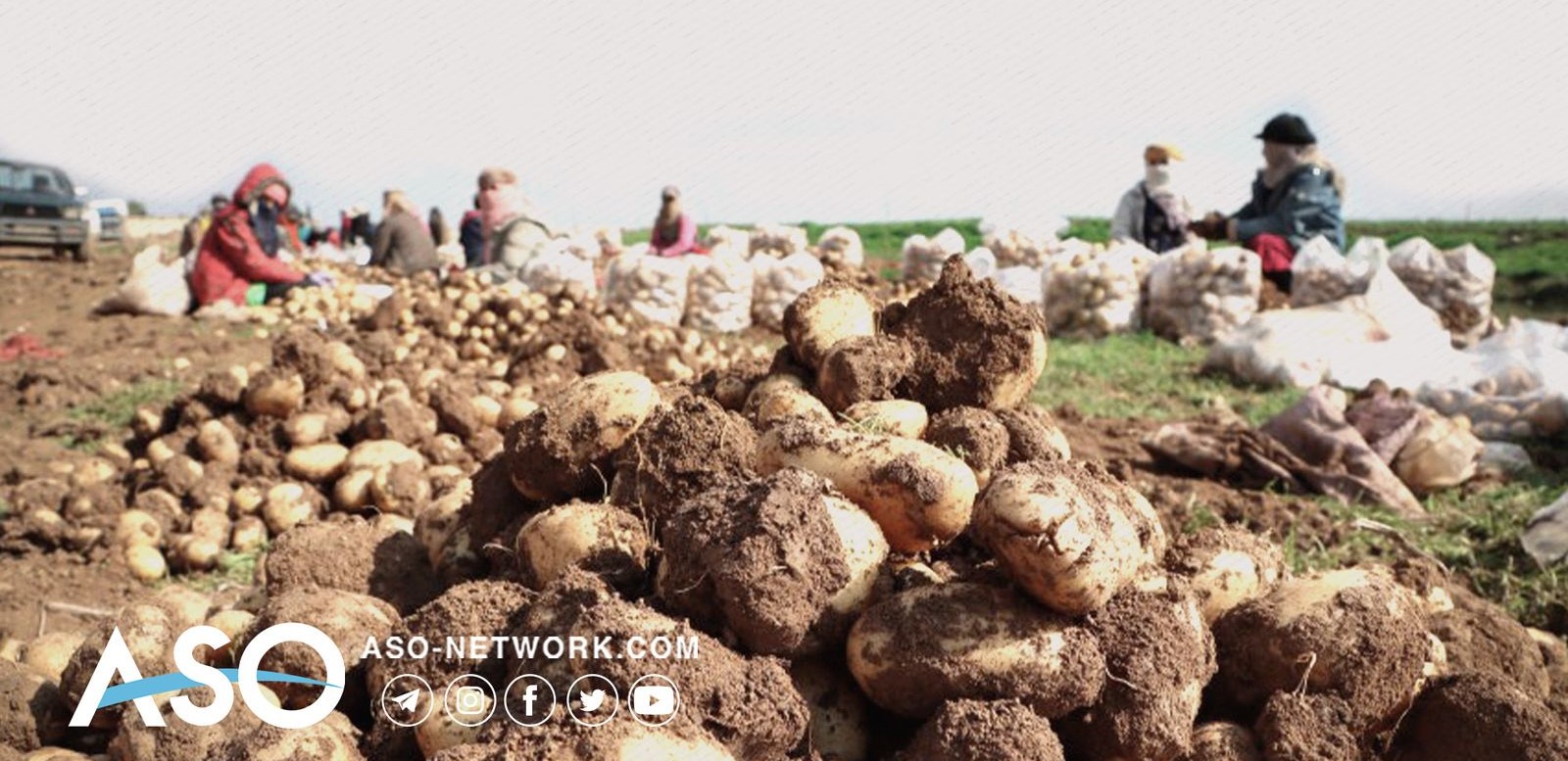News
Potato Harvest in North-East Syria… Yields Not Promising

Avin Alo
Despite poor agricultural conditions over the past four years due to drought, inconsistent rainfall, and fuel shortages, some farmers continue to cultivate their land. This is evident in the case of Fouad Ramadan Hassan, a farmer from Ainouik village in Amuda countryside.
Initially, his potato crop looked promising but was significantly affected by frost. “This is my first year planting potatoes. We distributed five tons of seeds over 15 dunams, costing more than $2,000 (approximately 20 million Syrian pounds), and the yield was about two tons,” Fouad said.
While potato production is usually good in summer, Fouad planted his crop in the fall, which requires suitable temperatures and high-quality fertilizers. As a result, weather conditions negatively impacted his yield.
He explained: “The difference between potato seeds planted in spring and fall is that fall yields usually reach only one to two tons at best. In contrast, spring crops perform much better because fall seeds are often hybrid, costing up to $2,000 per ton.”
The potato planting season begins in February, with harvesting in July. In contrast, winter crops are planted in October and harvested in January, according to Fouad Hassan.
Last year, the total potato cultivation area in Al-Jazira region ranged between 2,000 and 2,500 dunams, according to the Agriculture Directorate of the Autonomous Administration.
High Costs
Farmers complain about rising agricultural costs due to fuel shortages, forcing them to buy fuel on the black market. Additionally, seed prices are quoted in US dollars.
Hoping for a good season, 40-year-old Fouad turned to potato farming, but he now anticipates losses due to soaring production costs.
He explained to ASO News: “The price of one ton of seeds reached $300 to $400, while foreign seeds were sold for $1,200 to $1,700.”
Ali Ibrahim, a farmer from Talik village in Amuda countryside, told ASO News that although potatoes have become a staple crop in the region, the Agriculture Authority provides no support for any type of farming, including wheat and cotton. This lack of support hinders self-sufficiency.
Ibrahim stressed that ensuring a steady supply of diesel for irrigation wells would expand cultivated areas for potatoes, wheat, cotton, and other crops, thus boosting local market supplies in North-East Syria.
The first potato cultivation experiment in Amuda took place in 2001. Today, the region accounts for 90% of total potato farmland
annually, according to the Agriculture Authority in Al-Jazira.
Both Ibrahim and Fouad noted that before 2001, many farmers were unfamiliar with potato farming. However, they later gained experience from Aleppine farmers and began growing the crop.
Fouad Hassan, who has been farming for 25 years, said: “Before increasing the production costs, agriculture was profitable. But now, we sell our produce in Syrian pounds while buying seeds in dollars. When the dollar rate rises, we suffer huge losses.”
The agricultural sector faces numerous challenges, including soaring costs for seeds, fertilizers, and fuel, which have eroded farmers’ profits. The depreciation of the Syrian pound has worsened the situation, making imported inputs more expensive.
Additionally, the sector struggles with a severe labor shortage as many young people migrate abroad in search of better opportunities. This has driven up labor costs, further burdening farmers.
As a result, many farmers are incurring heavy losses, forcing some to abandon agriculture altogether. This could worsen the country’s food security crisis, as many depend on local production for their basic needs.
Urgent Solutions
To overcome these challenges, urgent measures are needed, such as financial support for farmers, easier access to agricultural inputs, and training programs to enhance farming skills. Improving rural living conditions is also essential to encourage young people to remain in the sector.
Rising production costs have placed a heavy burden on farmers. The prices of fertilizers, pesticides, and fuel have doubled, while crop prices remain low due to sales in Syrian pounds. As the currency continues to devalue against the dollar, the situation deteriorates further, as many agricultural inputs are imported in foreign currency, increasing their cost. This has led to a decline in cultivated areas and reduced production, threatening food security and increasing dependence on imports.
To address these issues, the Autonomous Administration must implement measures to support the agricultural sector, such as providing farmers with low-interest loans and stabilizing the exchange rate of the Syrian pound.
Despite these challenges, Fouad pointed out a key advantage of potato farming: “There are no customs duties, the product is readily available in the markets, and prices are low. Currently, potatoes sell for 2,000 Syrian pounds, whereas before, they were 3,000.”
Limited Production
Regarding the availability of locally grown potatoes in North-East Syria, trader Muwafaq Hassan explained that potato production in the region only lasts for one or two months. Additionally, imported potatoes are often cheaper than local ones because local farmers incur higher production and harvesting costs. If farmers cannot sell at higher prices, they suffer losses.
He added: “Potatoes are a commodity that can be stored in warehouses and sold later at higher prices if needed.”
Ibrahim Ali confirmed that farmers traditionally bought seeds from Aleppo on credit. However, due to recent events in Aleppo, only cash transactions were possible this year. As a result, the cultivated potato area was smaller, affecting production and profitability.
Agricultural engineer Kevork Ghazar noted that regardless of wheat and cotton yields, potato farming strengthens the soil by using chemical and natural treatments. The region’s saline soil also supports potato cultivation.
Ghazar emphasized that successful potato farming requires a full range of resources, including equipment, fertilizers, and consistent irrigation, to ensure a good harvest.
Agriculture in NE-Syria faces an uncertain future due to the lack of government support. The Agriculture Authority of the Autonomous Administration in Al-Jazira stated to ASO News that it has no plans to support the sector. This leaves farmers facing even greater challenges that may ultimately push them out of agriculture entirely.
